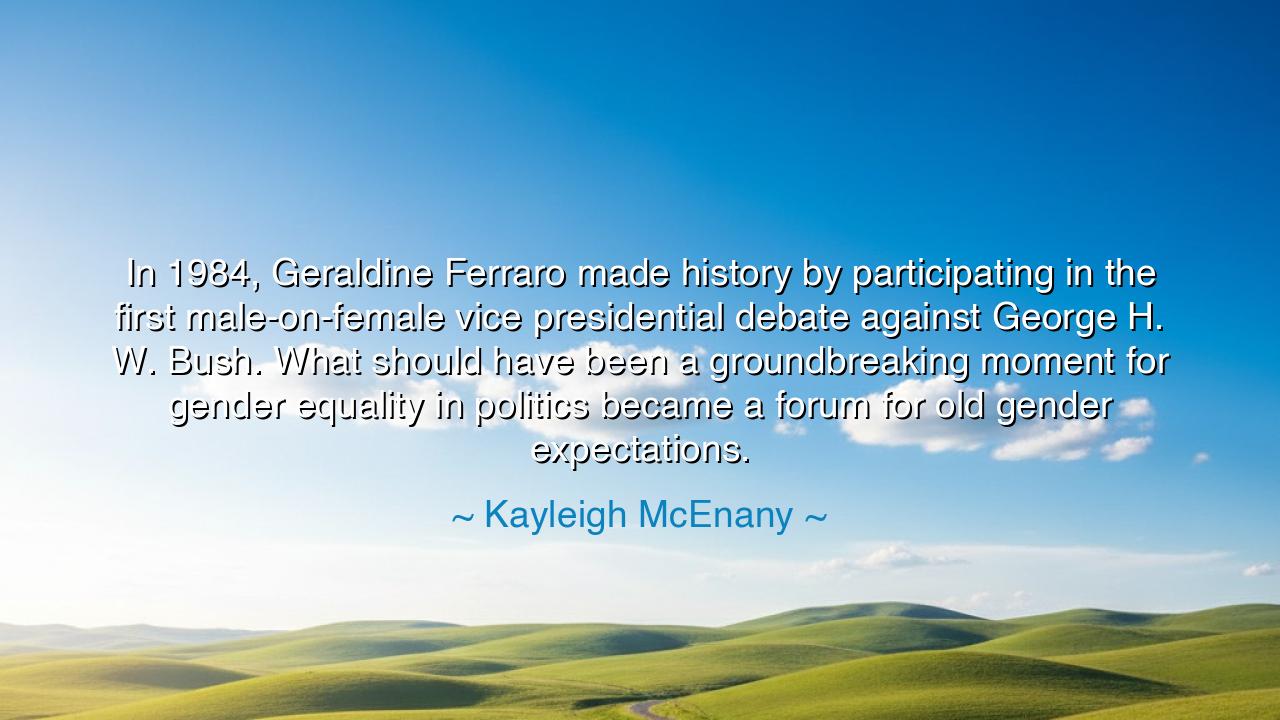
In 1984, Geraldine Ferraro made history by participating in the
In 1984, Geraldine Ferraro made history by participating in the first male-on-female vice presidential debate against George H. W. Bush. What should have been a groundbreaking moment for gender equality in politics became a forum for old gender expectations.






Hear now the words of Kayleigh McEnany, who reflected upon a moment carved into the chronicles of history: “In 1984, Geraldine Ferraro made history by participating in the first male-on-female vice presidential debate against George H. W. Bush. What should have been a groundbreaking moment for gender equality in politics became a forum for old gender expectations.” Within this statement lies a lament both ancient and ever-present — that progress, though often proclaimed, is rarely without resistance. Her words speak not merely of politics, but of the timeless struggle for recognition, of a woman’s right to stand as equal in intellect, in courage, and in authority among men.
In that fateful year, Geraldine Ferraro shattered a barrier that had stood since the founding of the republic. She was the first woman nominated by a major American party for the vice presidency — a symbol of possibility for millions who had been told that power was a man’s domain. Yet, as McEnany reminds us, the battlefield of ideas was not level. Ferraro entered the debate not only to defend her political vision, but to justify her very presence. The eyes upon her were not merely those of voters, but of a world still uncertain whether a woman could command, could challenge, could lead. Thus, what should have been a triumph of equality became an echo chamber of expectation — where every word, tone, and gesture was measured not by substance, but by stereotype.
Throughout the ages, this pattern has repeated like the turning of the seasons. When Joan of Arc rode to battle, men did not see a strategist; they saw a girl in armor. When Cleopatra ruled Egypt, her intellect and diplomacy were eclipsed by tales of her beauty. When Marie Curie discovered the secrets of radiation, her genius was doubted because her hands were those of a woman. So too with Geraldine Ferraro, who stood upon the modern stage but bore the ancient burden — the burden of representing all women in a world still learning to see beyond the surface.
The debate of 1984 was more than a clash of policies; it was a test of perception. Ferraro’s words were judged not only by their logic but by their tone — too strong, and she was deemed harsh; too gentle, and she was deemed weak. George H. W. Bush, her opponent, embodied a system long accustomed to dominance; she, by her mere presence, disrupted it. McEnany’s reflection captures this paradox: that even in the pursuit of equality, the structures of bias still shadow the path. Progress had arrived, yet it was dressed in the garments of old prejudice.
And yet, though the moment may have fallen short of its promise, it was not in vain. For every step taken by those who face injustice, even when resisted, becomes the foundation for those who follow. Just as Rosa Parks’ quiet defiance stirred a nation, so too did Ferraro’s courage awaken possibility. Her debate — though marred by unfair expectation — opened the door through which others would one day walk unchallenged. In the years since, women have risen to the highest offices and stood unflinching in the face of the same skepticism she once bore alone. Thus, her legacy endures not in perfection, but in perseverance.
From this, we learn a lesson as enduring as time itself: true progress does not unfold in applause but in struggle. Every first of its kind must bear the weight of misunderstanding, for the world is slow to unlearn its habits. Those who dare to step into spaces once denied them must be both pioneers and shields — enduring the blows of prejudice so that others may walk unharmed. It is not fair, but it is holy work, the work of transformation. And through such courage, civilizations evolve, one act of defiance at a time.
So let this teaching be remembered: when the world seems to celebrate progress while clinging to the past, do not despair. Change is not a single moment — it is a movement of many hearts across generations. Geraldine Ferraro’s courage teaches us that even imperfect victories light the way. Let us, then, honor such pioneers not only with remembrance but with






AAdministratorAdministrator
Welcome, honored guests. Please leave a comment, we will respond soon